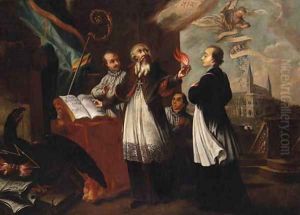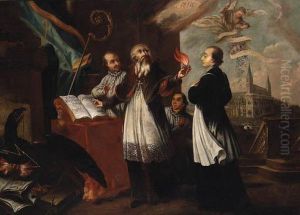Johann Baader Paintings
Johann Joachim Christoph Bode, often confused with Johann Baader due to similarities in their names, was actually a notable German translator and publisher in the 18th century, rather than a traditional artist. He was born on January 16, 1709, in Brunswick, Holy Roman Empire. His contributions to the arts were primarily in the realm of literature and intellectual exchange rather than the visual arts. Bode is best known for his translations of important Enlightenment works into German, particularly those of French writers like Voltaire.
Bode's career began in the field of music as a violinist, but he soon shifted his focus toward literature and translation. He moved to Hamburg and became a bookseller and publisher. His publishing house was an important venue for Enlightenment ideas, which were spreading throughout Europe during this period. Bode himself became a key figure in this intellectual movement in Germany, not only through his translations but also through his own writings and his involvement in various learned societies.
Throughout his life, Bode maintained a close connection with many prominent figures of his time, including Lessing and the philosopher Moses Mendelssohn. He was deeply involved in the activities of the Meiningen Court and eventually became the librarian there. One of his most significant contributions was his involvement in the German Masonic movement and his translation of the 'Encyclopédie' or 'Dictionnaire raisonné des sciences, des arts et des métiers,' which was a seminal work in the diffusion of Enlightenment ideas.
Johann Joachim Christoph Bode died on December 13, 1780, in Weimar. While he was not an artist in the traditional sense of painting or sculpting, his work as a translator and publisher had a lasting impact on the cultural and intellectual landscape of Germany and the broader European context. His efforts helped to disseminate progressive ideas that influenced many areas, including the arts, during a pivotal era of cultural evolution.

